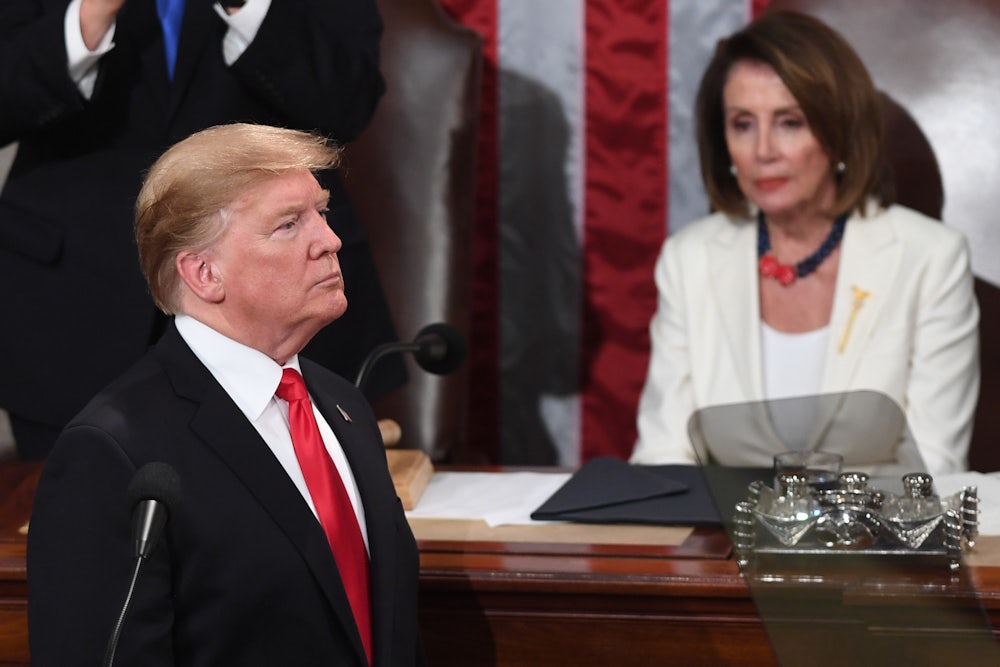Nancy Pelosi has run out of excuses for inaction. In a press conference late Tuesday afternoon, the House speaker announced the launch of an “official impeachment inquiry” into President Donald Trump. By asking Ukrainian President Volodymyr Zelensky to investigate Joe Biden’s son’s dealings in the country, Trump called “upon a foreign power to intervene in his election,” she said. “This is a breach of his constitutional responsibilities.” In response, Pelosi is directing the chairmen of six committees that have been investigating the president to compile a list of potentially impeachable offenses and send them to the Judiciary Committee.
Historians in the not-too-distant future may very well marvel that we hit the impeachment breaking point when we did. Trump’s budding Ukraine scandal had been hiding in plain sight for months before he apparently pressured Zelensky in July to investigate Hunter Biden. Rudy Giuliani has, with the president’s encouragement, been pressuring Kiev to investigate since at least May; when asked about what he was up to by The New York Times, he could not have sounded more villainous. “We’re not meddling in an election; we’re meddling in an investigation, which we have a right to do,” he said. “There’s nothing illegal about it. Somebody could say it’s improper.”
Trump’s entire time in office, moreover, may be best understood as a narrative of impeachable offenses. There’s his pressuring of James Comey to drop the investigation into Michael Flynn, his national security advisor at the time, and the seemingly unending meddling into attempts to investigate Russian interference in the 2016 election. The Mueller report, released earlier this year, reveals several instances of collusion and obstruction of justice. The president has used the presidency to direct millions to his personal businesses; a number of foreign governments have also spent lavishly at Trump properties. His use of pardons, his rampant violation of campaign finance laws, even his day-to-day conduct could all be constituted as impeachable.
And yet, Democrats held off from opening impeachment proceedings for months after retaking the House of Representatives in January. Led by Pelosi, the conventional wisdom was that impeachment was too unpopular and that it might backfire, not only hurting vulnerable suburban Democrats but also the party’s strong chances of defeating Trump in 2020. Finally, as my colleague Matt Ford wrote on Monday, Pelosi and others seemed to be waiting for a smoking gun, incontrovertible proof of guilt that even Sean Hannity couldn’t deny. This formula meant that Democrats privileged caution above all else, even as the president tweeted out evidence that he was unfit for office on an hourly basis.
The impeachment dam seems to have broken for two related reasons. One is that the president may have dangled a quid pro quo—or, more accurately, attempted to extort—the Ukrainian president, explicitly withholding promised aid unless Zelensky began an investigation into the activities of Hunter Biden, who served on the board of a large gas company in the country until this summer. The second is that Trump’s attempt to rope Ukraine into aiding his re-election effort is proof that he is fundamentally lawless. He not only has learned nothing from the lengthy investigation into the 2016 election, but is even more blatantly trying to get away with the same crime again. As The Atlantic’s David Frum wrote, “The Ukraine story confirms that Trump will do anything. Anything. Everything.”
The basic argument against impeachment advocated by Pelosi and other Democrats hasn’t really changed. Impeachment is still broadly unpopular. That may change—the impeachment of Richard Nixon started in a similar place and ended up being supported by a clear majority—but it most likely won’t for quite some time, making it exactly the kind of political risk that Pelosi has been trying to avoid.
More importantly, there likely will be no smoking gun. Trump announced on Thursday he would be releasing a transcript of his conversation with the Ukrainian president, something that he would be unlikely to do if the document contained an explicit quid pro quo. Instead, it’s more likely that there will be abundant evidence of wrongdoing—something similar to the dinner in which Trump repeatedly pressed former FBI Director James Comey for his “loyalty”—without anything that is indisputably illegal. The president and his allies will then make the most of the gray area, as they have done with a number of documents, including the Nunes and Comey memos and the Mueller report itself. (It’s also possible that the transcript of Trump’s call with Zelensky has been meddled with in an attempt to exonerate the president. Transcripts have been altered before. Again: Trump will do anything, everything.)
There is something almost arbitrary about this scandal instigating impeachment, given the barbarity of Trump and his administration. On a scale that includes keeping immigrant children in cages, I’m not quite sure where to rank the president’s pressuring the leader of a foreign country to investigate a political rival’s son. But it also doesn’t really matter. Impeachment is long overdue. If Trump’s call with Zelinsky is what gets us there, so be it.
For the last two years, Democratic leaders have been overly cautious, shirking their constitutional responsibilities out of a misplaced fear of electoral retribution. Republicans undoubtedly will call their investigation a witch hunt, as Trump did moments after Pelosi’s press conference. The president will muddy the waters, as he has with every other investigation, insisting that the facts were concocted by jealous rivals in order to undermine him. But he would have done that even if they had uncovered a smoking gun or were impeaching him for shooting someone on Fifth Avenue.
